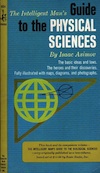Volume 1
This is the first complete outline of the physical sciences written for the average reader as well as for the specialist. Isaac Asimov, one of America’s most eminent scientist/authors, reviews the broad spectrum of the physical world in a clear exposition of the basic philosophies and principles.
Dr. Asimov’s journey through the physical sciences begins with an explanation of the universe and the birth of the solar system.
Volume 2
This is the first complete outline of the biological sciences written for the average reader as well as for the specialist. Isaac Asimov, one of America’s most eminent scientist/authors, reviews the broad spectrum of the biological world in a clear exposition of the basic philosophies and principles.
Dr. Asimov’s survey of the biological sciences discusses matter, man and his mind, and machines.
This is the first edition of Asimov’s general survey of all of science. While this is perhaps one of Asimov’s best-known non-fiction works, he did not like the first edition very much. Actually, he hated it. The editor for Basic Books, Leon Svirsky, had originally asked for a history of 20th century science. When Asimov gave him rather more, he was at first going to cut the book in half, and then (without Asimov’s permission) only cut it by a quarter or so. Asimov felt he did a bad job of it, too, although frankly you can only tell by doing a careful examination of what Asimov wanted to write (as in later editions, particularly The New Intelligent Man’s Guide to Science, which is the least updated) and what Svirsky did. Svirsky also—over Asimov’s objections—arranged for George Beadle, a well-known scientist (whom Asimov actually mentions in the text), to write an introduction.
The result is something which was a financial and critical success, but which Asimov himself disliked intensely.
(Svirsky went on to gut The Search for the Elements similarly, with the result that Asimov refused to deal with him at all in the future.)
(A digression: In the acknowledgements for the book, Asimov is rather unstinting in his thanks to these two men and uses terms which hide most effectively his actual bitterness over the whole book, which gives one an indication of how real thanks can be in an author’s acknowledgements.)
And I must admit that I agree that this is not one of Asimov’s best books, for all that it was enormously influential and popular. I find that there are two weaknesses that the book has.
The first is that I frankly think Asimov leaves out too much. The book is heavy on astronomy, the earth sciences, chemistry, and biology. Physics I tend to feel gets rather short shrift (although I’m not sure why, since particle physics is discussed at some length, as well as some stuff on light and relativity). One could also hope for more mathematics than an appendix (although one understands the reasons why).
Actually, I’m not sure what it is I think is missing, but there does seem to be something. I suppose if I sat down and listed everything that Asimov talks about, I’d figure it out.
My other objection has to do with the book’s organization. Again, I’m rather vague on why I feel this way, but the book’s very seamlessness works against it. Of course, science is a whole and not a bunch of well-separated pieces, but Asimov’s tendency to “stop and explain” here detracts. Some topics are spread out over enormous parts of the book, giving the feeling one is running in circles and seeing the same things over again.
Still, I’m probably jaded. I own all four editions of this work and have read each of them at least twice, if not three or four times, so this is without a doubt the Asimov non-fiction work I have read the most, and familiarity does breed contempt. Certainly the work’s continued popularity argues well for it, better, perhaps, than I am able to do.



